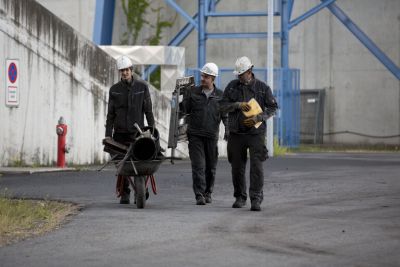This week the European Parliament voted to adopt the political deals at the heart of the ‘Fit for 55’ package. Including the revision and extension of the Emissions Trading Scheme and Carbon Border Adjustment Mechanism. IndustriAll Europe, and the ETUC reiterate their demand that the industrial and social changes that ambitious climate targets must be accompanied by new rights for European workers to anticipate and manage changes to guarantee a Just Transition for every worker in every region of Europe.
The Fit for 55 package is the main vehicle to deliver the European Green Deal, by increasing EU climate ambitions to reduce greenhouse gas emissions by 55% by 2030, and implement the EU Climate Law’s target of climate neutrality by 2050.
This objective represents a significant challenge for many sectors and its workers. Therefore, we support the objective of reaching climate neutrality by 2050 but insist that it must be through policies that secure a Just Transition for all workers.
In order to strengthen the global framework to tackle emissions we need proper financing, and for the revision of the 2030 climate target to be translated into concrete and adequate policy framework. The scope of the Just Transition Mechanism, which is limited to regions highly dependent on coal, lignite, peat, oil shale and carbon intensive industries, is too narrow. It also does not provide for support for other sectors that will be affected by the changes, such as transport, construction, agriculture, tourism and other industries.
ETUC calls for the adoption of policy measures to operationalise the ILO Guidelines for a Just Transition, adopted in 2015. Concretely, European trade unions are calling for the adoption of a Just Transition legal framework as part of the European Green Deal.
This new framework should be based on new workers’ rights to anticipate and manage change and social dialogue, to allow the systematic granular mapping and analysis of the impacts the transition will have on employment and skills in the different countries, regions, sectors and companies, including on subcontractors and the downstream value chains.
Such granular mapping would complement the overall perspective of previous impact assessments made by the Commission and would provide the necessary knowledge to develop adequate social policies as well as territorial and sectoral just transition pathway adapted to regional realities. It would also be useful to properly monitor and evaluate the implementation of European Green Deal policies in the future.
Only a socially fair transition can deliver the public support needed to implement the Fit for 55 changes. To ensure social acceptance, the concept of Just Transition should be mainstreamed across all policies.
ETUC Confederal Secretary Ludovic Voet said:
“Trade unions all over Europe believe that the transition to climate neutrality is desirable but cannot succeed without workers being in the driving seat. The climate policies adopted will affect jobs and increase prices. To mitigate the labour and social consequences of the transition, we cannot let market actors define their strategies alone. The creation of high-quality jobs is needed to tackle social inequalities and convince workers that they and their communities will not be left behind. Failing to deliver this just transition would be politically explosive. We call on the leaders of the EU institutions and members states to deliver concrete measures that will make a just transition a reality.”
IndustriAll Europe Deputy General Secretary Judith Kirton-Darling:
“As industrial trade unions, we support the goal of climate neutrality by 2050, but we insist on the need for a just transition for workers and a job-rich industrial strategy. Workers are embarked on this new industrial revolution, which badly managed will repeat the mistakes and social damage of the past. That’s why it is now urgent to set forward a legal framework to ensure that workers are codesign the changes happening. There should be Nothing About Us, Without Us!”
Photo: Workers at a coal-fired power station. European Parliament

